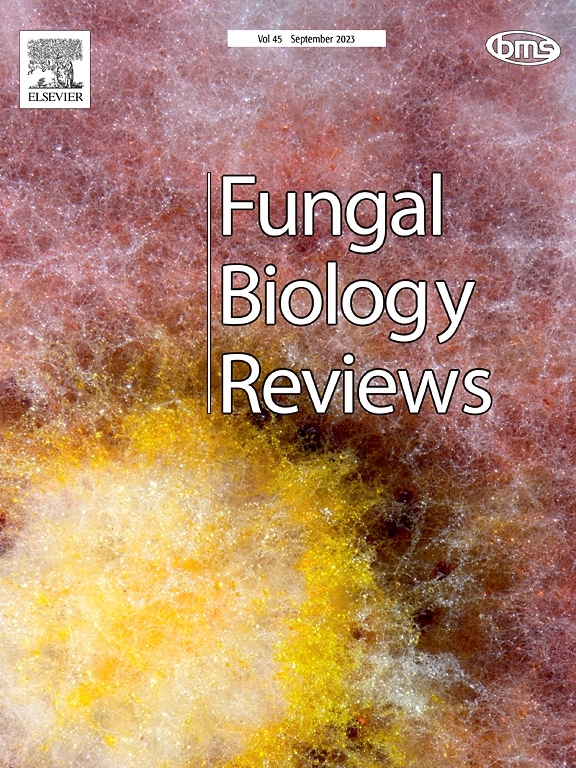A systematic review of abiotic factors influencing the production of plant cell wall-degrading enzymes in Botryosphaeriaceae
IF 4.6
2区 生物学
Q1 MYCOLOGY
引用次数: 0
Abstract
The Botryosphaeriaceae family includes many worldwide fungal pathogens of economically important woody plants. To penetrate and colonize the host, the Botryosphaeriaceae species utilize a diverse array of Plant Cell Wall-Degrading Enzymes (PCWDEs) that deconstruct the main plant cell wall polymers, i.e., cellulose, hemicelluloses, pectins, and lignins. Although the PCWDEs play an essential role in pathogenicity, little has been done to understand the effect of environmental factors on their production in Botryosphaeriaceae. To explore the main factors influencing PCWDE production in Botryosphaeriaceae species, we performed a systematic search in literature databases, identifying all the existing studies reporting lignocellulolytic and pectinolytic enzyme activities. Sixty-two articles met the inclusion criteria and were included in a meta-analysis of the carbon and nitrogen source effects on the production of laccase, cellulase, xylanase, and polygalacturonase activities. Our results show that poorly-lignified plant cell walls rich in polysaccharides and nitrates enhance PCWDE titers in Botryosphaeriaceae. We also discuss the influence of other abiotic factors, such as temperature, pH, metal ions, moisture content, and surfactants. This review may be helpful for future works that aim to increase knowledge on the PCWDE regulation in the Botryosphaeriaceae family.
影响 Botryosphaeriaceae 植物细胞壁降解酶产生的非生物因素系统综述
Botryosphaeriaceae 家族包括许多世界范围内具有重要经济价值的木本植物的真菌病原体。Botryosphaeriaceae 菌种利用各种植物细胞壁降解酶(PCWDEs)分解主要的植物细胞壁聚合物,即纤维素、半纤维素、果胶和木质素,从而穿透并定植于寄主。虽然 PCWDEs 在致病性中发挥着重要作用,但人们对环境因素对 Botryosphaeriaceae 中 PCWDEs 生成的影响了解甚少。为了探索影响 Botryosphaeriaceae 物种中 PCWDE 生成的主要因素,我们在文献数据库中进行了系统检索,确定了所有报道木质纤维素分解酶和果胶分解酶活性的现有研究。有 62 篇文章符合纳入标准,并被纳入了碳源和氮源对漆酶、纤维素酶、木聚糖酶和聚半乳糖醛酸酶活性产生影响的荟萃分析。我们的研究结果表明,富含多糖和硝酸盐的低木质化植物细胞壁可提高 Botryosphaeriaceae 的 PCWDE 滴度。我们还讨论了其他非生物因素的影响,如温度、pH 值、金属离子、含水量和表面活性剂。这篇综述可能对今后旨在增加 Botryosphaeriaceae 家族 PCWDE 调节知识的工作有所帮助。
本文章由计算机程序翻译,如有差异,请以英文原文为准。
求助全文
约1分钟内获得全文
求助全文
来源期刊

Fungal Biology Reviews
MYCOLOGY-
CiteScore
10.60
自引率
0.00%
发文量
36
期刊介绍:
Fungal Biology Reviews is an international reviews journal, owned by the British Mycological Society. Its objective is to provide a forum for high quality review articles within fungal biology. It covers all fields of fungal biology, whether fundamental or applied, including fungal diversity, ecology, evolution, physiology and ecophysiology, biochemistry, genetics and molecular biology, cell biology, interactions (symbiosis, pathogenesis etc), environmental aspects, biotechnology and taxonomy. It considers aspects of all organisms historically or recently recognized as fungi, including lichen-fungi, microsporidia, oomycetes, slime moulds, stramenopiles, and yeasts.
 求助内容:
求助内容: 应助结果提醒方式:
应助结果提醒方式:


